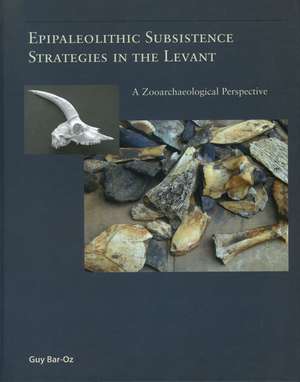Epipaleolithic Subsistence Strategies in the Levant: A Zooarchaeological Perspective: American School of Prehistoric Research Monograph Series, cartea 3
Autor Guy Bar-Ozen Limba Engleză Hardback – 31 iul 2004
Preț: 385.91 lei
Nou
Puncte Express: 579
Preț estimativ în valută:
73.84€ • 77.26$ • 61.34£
73.84€ • 77.26$ • 61.34£
Carte indisponibilă temporar
Doresc să fiu notificat când acest titlu va fi disponibil:
Se trimite...
Preluare comenzi: 021 569.72.76
Specificații
ISBN-13: 9780391042230
ISBN-10: 0391042238
Pagini: 154
Dimensiuni: 200 x 269 x 15 mm
Greutate: 0.62 kg
Editura: Brill
Colecția Brill
Seria American School of Prehistoric Research Monograph Series
ISBN-10: 0391042238
Pagini: 154
Dimensiuni: 200 x 269 x 15 mm
Greutate: 0.62 kg
Editura: Brill
Colecția Brill
Seria American School of Prehistoric Research Monograph Series
Public țintă
Archaeologists, anthropologists, and graduate students interested in subsistence activities and foraging patterns of ancient people and reconstructing their past environment from zooarchaeological and taphonomical perspectives.Notă biografică
Guy Bar-Oz, Ph.D. (2001) Tel-Aviv University, department of zoology. He holds academic degrees in zoology, ecology, and archaeology. Recently he concluded his post-doctoral research at the department of anthropology of Harvard University and is now affiliated with the department of archaeology, University of Haifa, Israel.



